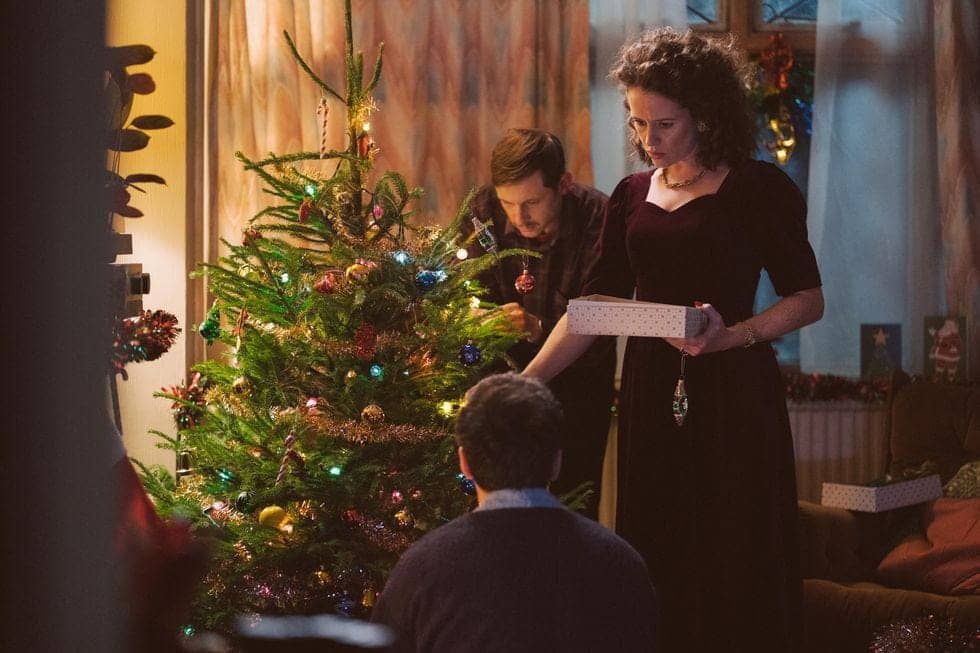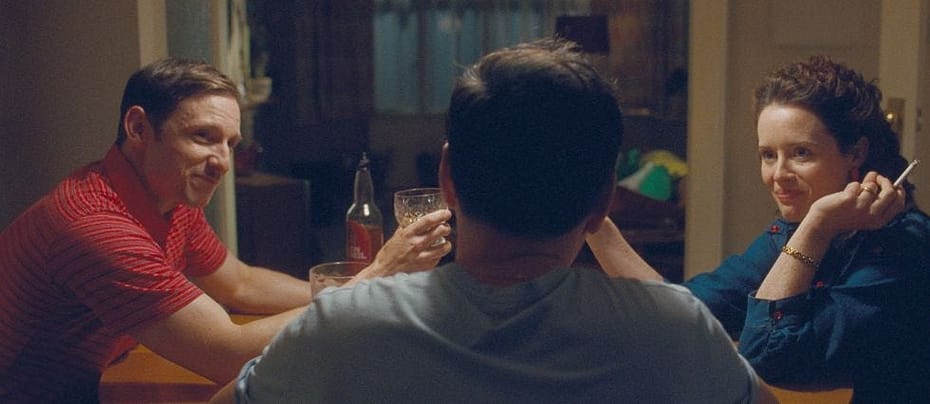Dwelling upon the day-dreamy romance movie ‘All of Us Strangers’
I finally found it within myself to overlook all the rave reviews and watch All of Us Strangers. It was free on Disney +, I had a bad cold, and was bored. And maybe feeling a bit sorry for myself.
Andrew Haigh’s melancholic, melodramatic, and nostalgic film was rather better than the universal critical acclaim led me to expect, and probably better than most gay love story movies that aren’t ‘in foreign’. (I also enjoyed his 2011 film Weekend.)
If still, in some ways, a flawed film, with an ending not perhaps as ‘twisty’ or surprising as billed – and one that, moreover, didn’t quite work. (There are entire Reddit boards devoted to ‘What does the ending of All of Us Strangers mean?’, which I’m not going to read.)
I discovered though that, like childhood, my opinion of it improved over time and distance. Maybe it was because I was wallowing in mucous, alone in my singly world, but it stayed with me for days afterwards. Although a “small” film, it was at the same time commendably ambitious.
Possibly my problem with the ending might just be down to my snobbish distaste for Frankie Goes to Hollywood’s ‘Power of Love’, their cheesy 1984 Xmas single that suddenly blares out at the climax of the final scene of this otherwise softly spoken movie.
In any event, I guess my snobbish distaste is part of the reason why I have a problem with gay movies that aren’t ‘in foreign’ – and part of the reason I’m terminally single.
The reason AUS is better than most gay romance films is largely because, without giving too much away, it is less of a gay romance than a film about gay loneliness – specifically the loneliness of a slightly timid 1980s gay boy, Adam, played by Andrew Scott, all grown up and middle-aged in the brave, shiny, rainbow-coloured, gay-married, alphabetty-spagetti, 21st century future.
But still essentially a very lonely 1980s boy, damaged by his past, his loss, and growing up in what was a very homophobic world – and now imprisoned in the ‘liberated’ present: ‘WFH’ alone in a lonely new tower block on the edge of a lonely new London. Mary without Mungo or Midge.
A London where most of his mates have moved to the suburbs “and there’s nothing for me in Dorking”. (Although, as we see, the reverse is actually true.)
A shy boy who (unlike me) doesn’t have the decency to fill the emptiness in the expected fashion, by throwing himself into the fleeting maelstrom of middle-aged ‘meets’. So, instead, lives in his head. And in the past.
Like the 1987 Japanese novel (and film) Strangers, that AUS is based on – and ‘gays’ up, if that’s the right term for something so melancholic – Adam visits the suburb he grew up in, and encounters a vision of his dead parents, who invite him into his childhood home, where everything is still 1984. When he was twelve and his parents were both killed in a car crash. He starts visiting them repeatedly.
During one visit, he tells the vision of his dead mother (Claire Foy) who is asking if he has a girlfriend, that he’s gay. “People say that it’s a very lonely life”, she says, a bit disappointed but clearly concerned for him. He counters with, “Oh, everything’s different now – gay people can get married!”.
He’s trying to bring his 1980s mother up to speed, but sounds like he’s trying to convince himself. Which of course, he is. When she asks, having found out that he doesn’t have a male partner, if he isn’t lonely, he replies “But that’s not because I’m gay!”.
Likewise, her response to the news about gay marriage: “That sounds a bit like having your cake and eating it”, doesn’t come across like prejudice, more like fair comment. (I would add, partly by way of self-justification, that probably most gay men are single and will remain single for most of their lives – and that this is not all or even mostly down to homophobia.)

Another reason why AUS stayed with me, as an incurable Freudian, is that the love story at its heart is the original love story – the family romance. After all, his mum is the young Queen Elizabeth II, and his dad is Billy Elliot. So Adam absolutely had to be a bender.
AUS is however even more Freudian than me. Unsettlingly so. The scene where Adam first encounters the vision of his father, for example. Adam is standing in a field of grass off a road near his family home. We don’t really know what he’s doing there. Though we might have an idea, given that he is a gay. Suddenly, he sees a young, good-looking man with a tache, looking at him, beckoning with his head. Adam follows him.
It turns out the beckoning handsome stranger is his 1980s father, inviting him back to his childhood home, where his mother is waiting.
This scene is so unsettling, that I almost ‘forgot’ it when it came to writing this piece, a couple of weeks later. Like an evaporating dream, I could remember Adam cruising a guy in a field but couldn’t quite grasp the memory of who it was….
Adam seems to be having these visions because he’s trying to make sense of who and where he is now, how he got ‘stuck’. But it also feels as if he’s realised that the family romance he had, and which was snatched away from him too soon, is as good as it’s going to get for him.
But it’s a gay family romance, so the scenes between adult Adam and his now younger, fit dad, have a deliberate erotic undertow. When Adam’s dad learns about how he was bullied daily at school for being a ‘poof’, he is visibly upset, heartily sorry for not consoling him when he heard him sobbing in his bedroom all those years ago, and hugs older adult Adam as a belated consolation of boy Adam.

The ambiguity of these scenes is only heightened by the fact that Jamie Bell looks a bit like Paul Mescal (28), who plays the mysterious, much younger gay man, Harry, that Adam has recently started to see (Scott is 47). When ‘dad’ (Bell is a very young 38) glimpses Harry, he describes him as “a handsome fella”. Clinching the matter, they both wear a white vest and have a tache.
Adam’s perceptive mum, however, notices that he looks “very sad – I hope you can cheer each other up.” (A clue as to Harry’s provenance.)
We also know from the sex scene between Adam and Harry, that although Adam is older, he wants Harry to be the ‘daddy’. But for the first time – he explains he was so scared by Aids, the scourge of his 80s & 90s youth, that he has never had penetrative sex before. (This may seem unlikely, given the existence of condoms, but the ‘GAY PLAGUE!’ years were mad scary – and Adam is tremulously timid; contrary to the soap opera propaganda, not all gays are tough cookies.)
We even have a scene where adult Adam, spending the night at the ghostly family home, goes into his parents’ bedroom and complains that he can’t sleep – a ploy that we learned earlier he used a lot as a kid. Andrew Scott is given permission to get into bed and snuggles between Jamie Bell and Claire Foy.
Well, wouldn’t you?
As if this wasn’t enough, Paul Mescal/Harry pops up in bed as well, in Jamie Bell/dad’s place: “What are you doing here?” asks Adam. This is really rubbing our noses in it. (It’s also, by the way, another clue about Harry.)
I have to admit that I did cackle, loudly, elsewhere when Adam tells Harry he wants to go out for the night “into the world”, and the very next scene is set in a bar that is instantly recognisable as the Royal Vauxhall Tavern, a piss-soaked Victorian drag pub just south of the river, wedged between a busy road and a railway viaduct, that I know all too well from my own stint on the London frontline from the mid-1980s to the mid-noughties, before running away to the provinces. (And apparently, if this film is to be believed, now chock full of hipsters.)
Is there no other gay bar left in London? I asked myself. It’s always the bloody RVT! In fact, the moment they said they were going out I knew it was going to be the RVT.
And then I learned, thanks to a friend who still visits the frontline, that yes, the RVT is pretty much the last gay pub in London. Or was. (The current owners have just put it up for sale, in a bit of a sulk.)
So, you can understand even better why Adam felt so lonely and beached – and moved back to the suburbs in his head.
Like many others, I have a fond regard for the actor Andrew Scott. His brand is likeability, after all. I thought he was great as Gethin Roberts in Pride (2014) (and I was actually in LGSM). as the semi-closeted gay English teacher at a boys’ boarding school in Handsome Devil 2016 (a much better film than the strangely similar later TV series Heartstopper), and as the sexy priest struggling and failing to be non-sexy in TV series Fleabag (2019).
And he carries this challenging role in AUS well, (mostly) keeping our sympathy, interest and conviction in unlikely and, as I say, deliberately unsettling and awkward situations.
My fondness was severely tested however by Ripley (2024), a pointless Netflix adaptation of Patricia Highsmith’s Ripley novels, with Scott in the role of Tom Ripley. That wasn’t really his fault: he was miscast (way too old), the script and direction was leaden and tedious, and there were so many episodes – eight – it was like we were watching his life in real time.
But the series had a really cool Insta retro b/w filter! And amazing baroque interiors! And yet was, like, totally now and relevant! e.g. the appearance of Sting’s ‘non binary’ – and non-acting – daughter as Freddie, with everyone in early 1960s Italy pretending not to notice that the young American playboy is plainly a girl – a girl that it seems no one has ever said ‘no’ to.


